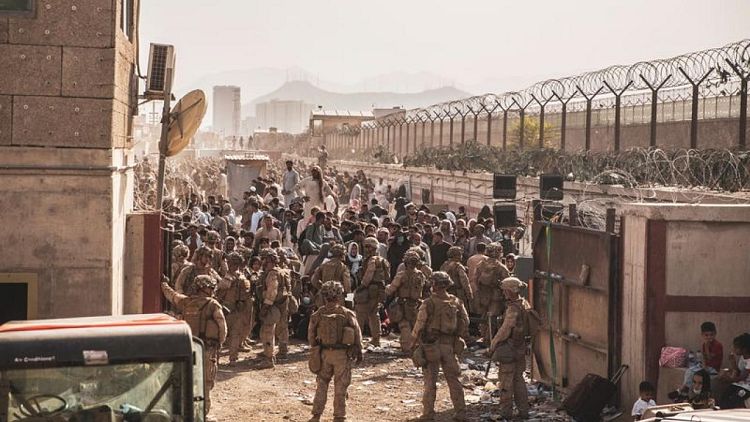(Fixes typo in first paragraph)
- Afghanistan's new Taliban rulers said on Tuesday they wanted all foreign evacuations from the country completed by an Aug. 31 deadline and they would not agree to an extension as Group of Seven (G7) leaders met to discuss the crisis.
The hardline Islamist group also sought to assure the thousands of Afghans crowded into Kabul airport in the hope of boarding flights that they had nothing to fear and should go home.
"We guarantee their security," Taliban spokesman Zabihullah Mujahid told a news conference in the capital, which Taliban fighters seized on Aug. 15.
As he spoke, Western troops were working frantically to get foreigners and Afghans onto planes and out of the country. U.S. President Joe Biden faced growing pressure from allies to negotiate more time for the airlift.
Chaos punctuated by sporadic violence has gripped the airport following the Taliban's rapid takeover of the country.
Leaders of the G7 countries - Britain, Canada, France, Germany, Italy, Japan and the United States - were meeting virtually to discuss the crisis.
CIA Director William Burns met Taliban leader Abdul Ghani Baradar in Kabul on Monday, two U.S. sources told Reuters.
The Taliban's Mujahid said he was not aware if Baradar had met the CIA chief. But he said the group had not agreed to an extension of the deadline and it wanted all foreign evacuations to be completed by Aug. 31.
He also called on the United States not to encourage Afghan people to leave their homeland.
The Taliban also urged foreign embassies not to close or stop work.
"We have assured them of security," he said.
DEADLINE LOOMS
Countries that have evacuated nearly 60,000 people over the past 10 days were trying to meet the deadline agreed earlier with the Taliban for the withdrawal of foreign forces, a NATO diplomat told Reuters.
"Every foreign force member is working at a war-footing pace to meet the deadline," said the official, who declined to be identified.
Biden, who has said U.S. troops might stay beyond the deadline, has warned the evacuation was going to be "hard and painful" and much could still go wrong.
Democratic U.S. Representative Adam Schiff, chairman of the House of Representatives Intelligence Committee, told reporters he did not believe the evacuation could be completed in the days remaining.
"It's possible but I think it's very unlikely given the number of Americans who still need to be evacuated," Schiff said.
White House national security adviser Jake Sullivan said at a news briefing Monday that "we will continue to get Afghans at risk out of the country even after U.S. military forces have left".
British defence minister Ben Wallace told Sky News he was doubtful there would be a deadline extension. But German Foreign Minister Heiko Maas said Germany was working with the United States and Britain to ensure the NATO allies can fly civilians out after the deadline.
RED LINE
The frantic evacuation operation kicked off after the Taliban seized Kabul on Aug. 15 and the U.S.-backed government collapsed as the United States and its allies withdrew troops after a 20-year presence.
The militant group had been ousted by U.S.-led forces in the weeks after the Sept. 11, 2001, attacks on the United States by al Qaeda militants whose leaders had found safe haven in Afghanistan.
Leaders of the Taliban, who have sought to show https://www.reuters.com/world/asia-pacific/taliban-seek-present-moderate-face-they-take-control-afghanistan-2021-08-15 a more moderate face since capturing Kabul, have begun talks on forming a government that have included discussions with some old enemies from past governments, including a former president, Hamid Karzai.
But many Afghans fear reprisals and a return to a harsh version of Islamic law that the Taliban enforced when in power from 1996 to 2001, in particular the repression of women.
Seeking to ease such fears, Taliban spokesman Mujahid said it was trying to come up with a procedure so women could return to work.
He also said there was no list of people targeted for reprisals.
"We have forgotten everything in the past," he said.
However, the top U.N. human rights official, Michelle Bachelet, said she had received credible reports of serious violations committed by the Taliban, including summary execution of civilians and restrictions on women and protests against their rule.
"A fundamental red line will be the Taliban's treatment of women and girls," she told an emergency session of the Human Rights Council in Geneva.
UNITED G7 STAND
The G7 leaders could discuss taking a united stand on the question of whether to recognise a Taliban government, or alternatively renew sanctions to pressure the movement to comply with pledges to respect women's rights and international relations.
"The G7 leaders will agree to coordinate on if, or when, to recognise the Taliban," said one European diplomat.
In Moscow, Russian Foreign Minister Sergei Lavrov said the Kremlin was interested in serving as a middleman in resolving the crisis along with China, the United States and Pakistan.
At the same time, he said, Russia opposes the idea of allowing Afghan refugees to enter the ex-Soviet region of Central Asia or having United States troops deployed there.
"If you think that any country in Central Asia or elsewhere is interested in becoming a target so that the Americans could fulfil their initiatives, I really doubt anyone needs that," Lavrov said during a visit to Hungary.
